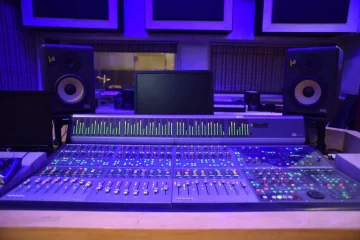Key Takeaways:
- Music education enhances cognitive, social, and emotional skills.
- Students involved in music programs perform better academically.
- Music can provide a sense of community and belonging.
Introduction
Music education profoundly impacts students’ lives, offering benefits that extend far beyond the classroom. In schools across the country, educators are realizing that incorporating music into the curriculum is not just about teaching students how to play instruments or read notes. These programs provide critical skills that help students excel both academically and personally.
Addressing the need for music teacher resources can play a pivotal role in sustaining and enriching these programs. Understanding the far-reaching advantages of music education can inspire more schools to prioritize and support these essential programs, ensuring students continue to reap the numerous benefits of music education.
Cognitive Benefits of Music Education
Numerous studies have shown that music education significantly enhances cognitive abilities. Playing an instrument or reading music involves complex mental processes that improve memory, spatial-temporal skills, and language abilities. Engaging in musical activities can enhance the brain’s capability to process different kinds of information, making it an excellent exercise for the mind.
Students regularly participating in music programs often exhibit better problem-solving skills and higher IQ scores. This cognitive development doesn’t just stay confined to music classes; it also translates into improved performance in other academic areas. These students often show enhanced abilities in critical thinking and can easily connect complex ideas. The mental rigor in learning and performing music may underline the positive correlation with heightened academic performance.
Emotional and Social Growth Through Music
Beyond cognitive benefits, music education also fosters emotional and social growth. Playing in a band, orchestra, or choir requires students to work harmoniously, developing teamwork and empathy. Music can be a powerful emotional outlet, helping students manage stress and express their emotions creatively. It provides a safe space for self-expression and emotional release, which can be particularly important during the turbulent adolescent years.
The emotional support gained from participating in music programs contributes to better mental health. Students often feel happier and more fulfilled, positively impacting their overall well-being. Moreover, music education encourages the development of empathy as students learn to understand and appreciate the emotions conveyed through different pieces of music. These experiences can strengthen their interpersonal relationships and social skills, making them more effective communicators and collaborators.
Academic Advantages
Academic success and music education often go hand-in-hand. Research indicates that students involved in music programs tend to perform better in subjects like mathematics and reading. The analytical skills required for music theory, the discipline of practice, and the ability to focus during performances can significantly enhance students’ academic capabilities.
For example, learning to play an instrument involves understanding fractions, rhythm, and patterns, all of which are foundational skills in mathematics. Additionally, the practice, discipline, and attention to detail required for musical performance can enhance a student’s ability to focus and sustain attention in other academic subjects. Furthermore, reading and interpreting musical scores can improve language skills and reading comprehension. Thus, students who participate in music programs may find themselves better prepared for standardized tests and other academic challenges.
Building a Sense of Community
Music has the incredible ability to bring people together, creating a sense of community and belonging. School music programs often form solid and supportive networks among students, teachers, and parents. These programs can source school pride and community cohesion, encouraging students to work together towards common goals.
A sense of belonging can significantly impact students’ attitudes towards school and learning. When students feel part of a community, they are more likely to engage in school activities and strive for academic success. The importance of community in educational settings cannot be overstated, as it plays a crucial role in students’ holistic development. Students build long-lasting relationships and develop teamwork skills essential for success in and out of school by participating in music programs.
The Lifelong Impact of Early Music Education
The benefits of music education extend well into adulthood. Early exposure to music fosters a lifelong appreciation for the arts and can lead to increased cultural awareness. Individuals who participated in music programs during their school years often continue to engage in musical activities as adults, whether as performers, educators, or avid listeners.
Real-life stories abound of individuals who attribute their personal and professional success to their early music education. For example, many successful professionals in diverse fields often credit their background in music with providing essential skills like discipline, creative problem-solving, and persistence. These stories highlight the enduring impact of music on personal development and underscore the importance of sustaining music programs in schools. Appreciating and understanding music adds a rich dimension to one’s life, providing joy and inspiration.
How Parents and Educators Can Support Music Programs
Supporting music programs requires concerted efforts from both parents and educators. There are several ways to advocate for and strengthen these initiatives. Fundraising events and community support can provide the necessary resources for sustaining music programs. Hosting concerts, talent shows, and other music-related events can raise awareness and funds while showcasing students’ talents.
Additionally, integrating music education into other subjects can create a more enriching and holistic learning experience for students. Educators can seek grants and partnerships to enhance their music programs, while parents can volunteer and participate in school events. By working together, parents and educators can ensure that music education remains a vibrant and vital part of the school curriculum. Advocacy at the school board level and in local communities can also help sustain and grow music programs that might otherwise face budget cuts.
Conclusion
Music education is more than just an extracurricular activity; it’s a powerful tool transforming lives. From cognitive and academic benefits to emotional and social growth, the advantages of learning music in schools are manifold. Understanding and supporting music education can help shape well-rounded, successful individuals who appreciate the arts and contribute positively to society.




